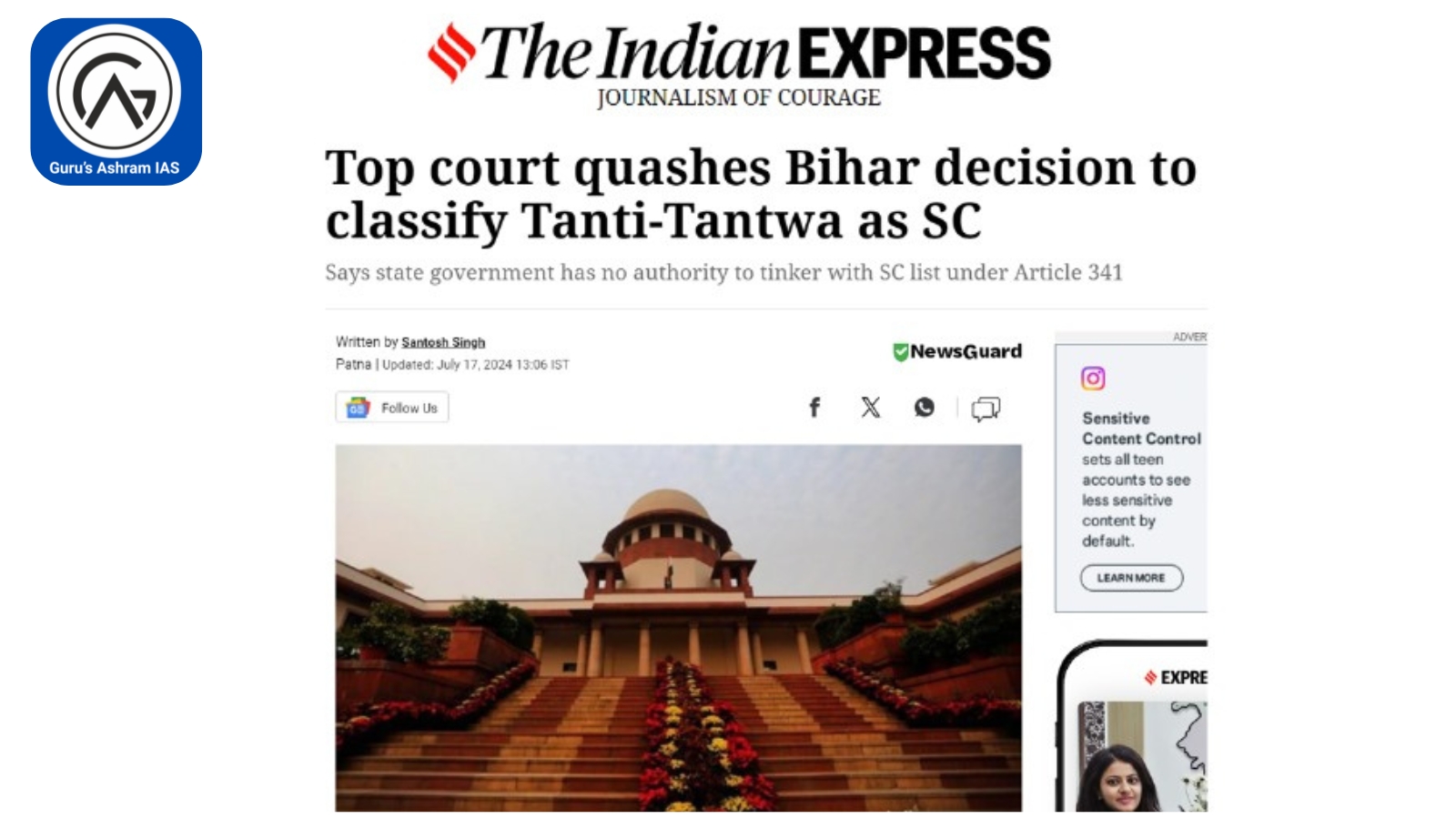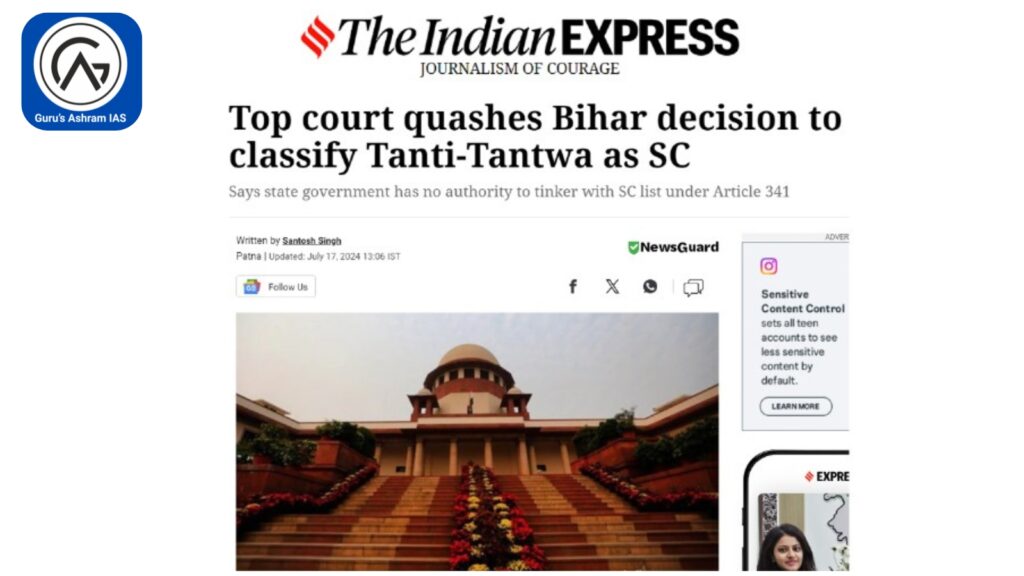Tanti-Tantwa : Supreme Court
- Recently, the Supreme Court ruled that states do not have the right to make changes in the Scheduled Castes (SC) list published under Article 341 of the Constitution.
- The decision comes at a time when the court has quashed a 2015 Bihar government notification that sought to classify the Tanti-Tantwa community as a Scheduled Caste (SC) and highlighted the importance of strictly adhering to constitutional provisions governing such classification.
Note:
- The Tanti-Tantwa are a Hindu caste belonging to the weaver and cloth merchant community in India. The community has a significant presence in states like Gujarat, Maharashtra, Jharkhand, Bihar, Uttar Pradesh, West Bengal, Assam and Odisha.

Background of the case and the decision of the Supreme Court:
Background of the case:
- The Tanti-Tantwa community was earlier classified as Extremely Backward Class (EBC) under the Bihar Reservation of Vacancies in Posts and Services (for Scheduled Castes, Scheduled Tribes and Other Backward Classes) Act, 1991.
- On July 1, 2015, the Bihar government issued a proposal to merge the Tanti-Tantwa community in the SC list based on the recommendation of the State Commission for Backward Classes (SCBC).
- The decision was aimed at extending the benefit of Scheduled Castes to the Tanti-Tantwa community and was upheld by the Patna High Court in 2017, but later challenged in the Supreme Court.
Decision of the Supreme Court:
- The court said that the state government has no right to make changes in the Scheduled Castes list published under Article 341 of the Constitution.
- Article 341 (1) of the Indian Constitution empowers the President of India to specify the Scheduled Castes in various States and Union Territories.
- Article 341 (2) empowers the Parliament to amend this list. Thus, any change in the SC list requires an amendment to the Constitution.
- The court said the Bihar government did not follow due process and did not consult the Registrar General of India, who did not support the proposal to include Tanti / Tantwa in the list of Scheduled Castes.
The court termed the state government’s notification as “mala fide” and an unforgivable “mischief,” depriving genuine SC members of their due benefits. - The court quashed the proposal but took a balanced view in the case of those who had already benefited from the proposal. The court directed that such persons should be accommodated in their original EBC category, and the SC quota posts they were holding should be reverted to the SC category.
Implications of the Supreme Court judgment:
- The judgment reaffirms the constitutional scheme according to which only Parliament can make changes in the list of Scheduled Castes and the State Governments cannot unilaterally alter it.
- The decision protects the interests of genuine SC members by ensuring that benefits meant for them are not extended to other communities.
- This judgment upholds the separation of power by clearly delineating the powers of the legislature and the executive in relation to the SC list.
- It can become a precedent for other states who are trying to make unauthorised changes in SC / ST lists, which is a common issue across the country.
Procedure for Amendment / Alteration in Scheduled Castes (SC) List:
Initiatives and Investigations:
- The State Government proposes to include or exclude a community in the list of Scheduled Castes, which is examined by the Ministry of Social Justice and Empowerment.
- The proposal is then evaluated based on socio-economic factors and historical data, in which the opinion of the Registrar General of India is also taken.
Expert Consultation and Cabinet approval:
- The National Commission for Scheduled Castes (NCSC) provides expert recommendations on the proposal.
- The Cabinet then reviews the proposal after considering the recommendations of the NCSC and other factors and approves the proposed amendments.
The parliamentary procedure:
- A Constitution Amendment Bill is introduced in Parliament detailing the proposed amendments to the Scheduled Castes list.
- The passage of the Bill requires a special majority i.e. a majority of the total members present and voting in both the Houses as well as a majority of the total members present in each House.
President’s approval and implementation:
- Once the Bill is passed by both the Houses, it is sent to the President for assent. After the assent of the President, the amendments made in the Scheduled Castes List officially come into force.
Criteria for inclusion in the list of Scheduled Castes: - The extreme social, educational and economic backwardness caused to communities by the traditional practice of untouchability.
Registrar General of India
- The Office of the Registrar General of India was established in the year 1961 by the Government of India under the Ministry of Home Affairs.
- It arranges, conducts and analyses the results of the Demographic Surveys of India including the Census of India and the Linguistic Survey of India.
- The post of Registrar is usually held by a civil servant holding the rank of Joint Secretary.
Constitutional Provisions relating to the upliftment of Scheduled Castes:
- Article 15 (4) makes special provision for the upliftment of the Scheduled Castes.
- Article 16 (4A) allows reservation in promotion to posts in the state services for the Scheduled Castes / Scheduled Tribes who are under-represented.
- Article 17 abolishes untouchability.
- Article 46 directs the State to promote the educational and economic interests of the Scheduled Castes and the Scheduled Tribes and to protect them from social injustice and exploitation.
- Article 330 and Article 332 provide for reservation for the Scheduled Castes and the Scheduled Tribes in the Lok Sabha and the State Legislative Assemblies respectively.
- Article 335 ensures that the claims of the members of the Scheduled Castes and the Scheduled Tribes are considered in accordance with the maintenance of efficiency in administration while making appointments to Government services.
- Part IX (Panchayats) and Part IXA (Municipalities) provide for reservation for Scheduled Castes and Scheduled Tribes in local governing bodies.
- Article 243D (4) The provision makes it mandatory to reserve seats for Scheduled Castes in panchayats (local self-government institutions) in proportion to their population in the area.
- Article 243T (4) The provision ensures reservation of seats for Scheduled Castes in municipalities (urban local bodies) in proportion to their population in that area.




